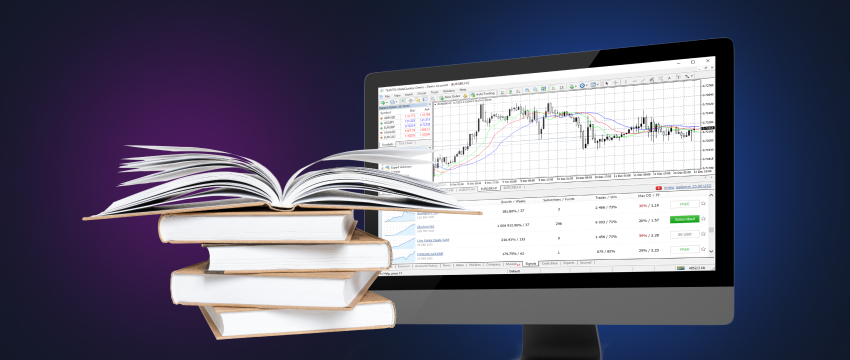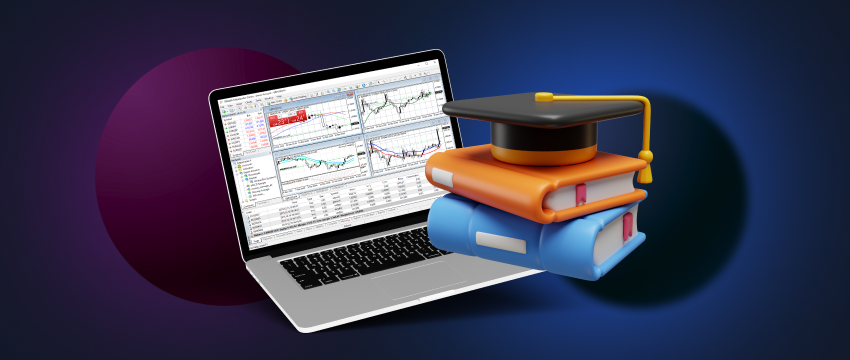So how does one become well versed in forex and all things forex trading? Is there any one way to learn forex fundamentals or are there a variety of resources for one to consume to become a better, more informed trader? And how long does it take to acquire this information and expertise? How fast can one learn forex? This is what we’ll be exploring in this blog.
The forex market is massive. So much so that trillions of dollars change hands on the daily. This also makes it a highly active market with varying levels of volatility impacting trades every second.
Knowing how to cope with the challenges that come with trading in the largest financial market in the world requires skill, knowledge, and practice. It also needs a strong psychology to mitigate emotive trading that more often than not, leads to poor capital outcomes.

Getting an forex education
One of the most important aspects of forex trading is staying informed. Markets are constantly evolving, and technologies continue to rapidly advance.
One must leverage knowledge to stay ahead and to ensure a decision-making process that is based on data rather than driven by feelings.
The learning pace can be as fast or as slow as you choose, but is also dependent on certain factors:
- The amount of time you have to dedicate to learning
- Your willingness to source and engage with material
- The availability of reliable resources
- The complexity of the topics you’ll be studying
- Your ability to adapt to and implement new information
Let’s look at these points in more detail.
Availability of time
The amount of time that you dedicate to learning forex trading will directly impact how quickly you can progress.
A trader that allocates several hours a day to studying forex will likely move ahead more rapidly than someone with limited time due to other commitments or responsibilities.
Ultimately, staying consistent is what matters most, whether you’re committing a few hours daily or just a few hours a week. So, strike a balance that fits your schedule, making sure that you can regularly stay engaged with the material.

Engaging with forex material
Complacency has no place in forex trading. To increase your likelihood for success, you must be willing to continuously engage with educational content, market analysis, and trading practice.
It is only with a proactive approach to gaining an efficient education that you’ll learn forex more quickly, as well as grow and refine your skills over time. Stagnate and you’ll inevitably fall behind, putting your capital at risk with poor trading decisions.
Sourcing credible resources
The availability of credible and trustworthy trading related resources also plays a significant role in how fast you can learn forex. By consuming reliable resources that provide clear and accurate insights will probably accelerate the learning process.
Adversely, consuming inaccurate or even outdated information may lead to uninformed trading decisions, slowing you down, and hindering your ability to act swiftly in what is undoubtedly a fast-paced environment.
Therefore, having access to the right trading tools and materials is crucial for effective learning. But where does one get their hands on these? Well, aside from the internet that is packed with forex related resources, reputable traders like T4Trade typically offer a variety of learning tools for traders to use.
More specifically, T4Trade provides:
- Exclusive forex webinars for useful insights and strategies delivered by experts.
- Forex podcasts to improve trading knowledge and sharpen your skills.
- Informative forex related videos for trading tips, market insights, and daily commentary for beginner and experienced traders.
- eBooks designed by the brokers in-house research team, and which offer educational guidance to boost the trading experience.
- Live TV with live discussions from expert analysts, relating to the latest market trends and trading tips.
- A popular blog pagecovering fundamental forex related topics to help you learn something new.
- An Economic Calendar for vital real-time, updated macro-economic data to make accurate trading decisions. This includes central bank announcements, employment reports, GDP releases, interest rates, and more.
- Trading calculators to learn more about pip value, margin requirements, and leverage. They also help to determine theoretical profit and loss and highlight potential risks inherent in a particular trade.
Complexity of forex trading concepts
As with any new subject, the more complex the topic, the harder and slower it will be to absorb. In other words, the complexity of what you are learning will influence the speed at which you advance.
Forex trading is not different, especially taking into account the wide range of concepts it encompasses, from basic terminology to advanced strategies.
Don’t let this be a deterrent though. Take the time you need to properly study as much as you can. The more effort you put into learning, the more confident and capable you’ll become in handling the complexities of forex trading.
Adapting and implement new information
Part of the learning process is knowing what information to seek out, and then adapting to and implementing what you’ve learned to execute trades.
An important aspect of forex trading is monitoring economic news and releases and other market moving events for instance. This is because they can heighten market volatility and liquidity, requiring you to have the ability (and the insight) to react as the news, releases, or events unfold in real time.
Therefore, take the time to integrate the tracking of these information sources into your learning schedule, ensuring you aren’t only improving your theoretical knowledge but also your knowledge of current affairs that drive currency prices.
Make improving your trading psychology part of the learning process
Trading psychology refers to the influence that our feelings have on financial decision making. Emotive trading can very quickly lead to poor trading outcomes so knowing how to handle feelings like fear or anger, arrogance or greed, and so forth, is vital. Make working on your trading psychology part of the entire learning process of becoming a forex expert.
Not only does it nurture emotional resilience, it is also necessary for ongoing development and improvement. Further, it will help you objectively analyse and learn from your mistakes without allowing them to overwhelm you.
A robust trading psychology can increase your potential for trading success by teaching emotional stability and regulation.

But what are some ways to calm the mind in the course of trading forex:
- Build a trading plan and stick to it. This will improve focus and discipline.
- Incorporate mindfulness practices into your daily routines.
- Take regular breaks by stepping away from the screen, to avoid burnout or trading fatigue.
- Engage in some form of physical exercise and eat more healthily.
- Set realistic goals and accept that losses will always be part of the forex trading experience.
- Engage with the wider trading community for emotional support and shared experiences.
Forex Trading with T4Trade
T4Trade is an award-winning broker that continues to gain popularity among global traders. This is attributed to its top-tier, 24/5 multilingual customer support team, cutting-edge trading platforms, and flexible trading conditions. T4Trade Education is a great resource for traders looking to learn more about forex fundamentals.
A variety of videos, podcasts, eBooks, webinars, and videos-on-demand are curated by inhouse specialists, catering to all types of traders.
T4Trade traders also have access to over 300 trading instruments across 6 asset classes, flexible leverage, narrow spreads, quick execution and convenient deposit and withdrawal options. Traders can also choose from multiple trading accounts that best suit their needs and individual preferences.
Disclaimer: This material is for general informational and educational purposes only and should not be considered investment advice or an investment recommendation. T4Trade is not responsible for any data provided by third parties referenced or hyperlinked in this communication.




